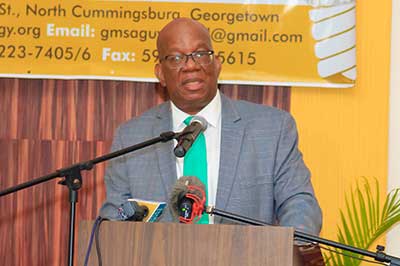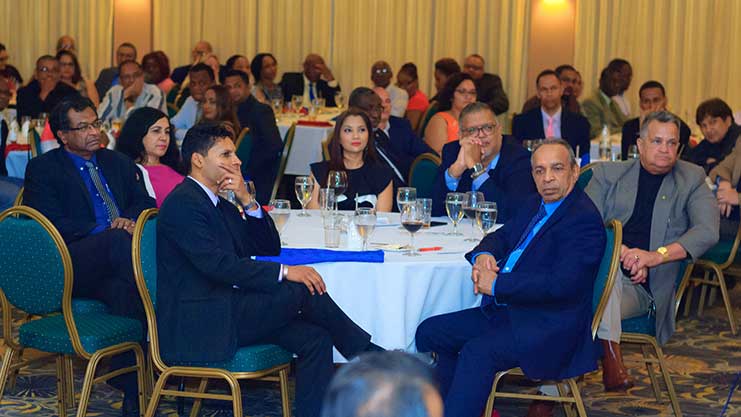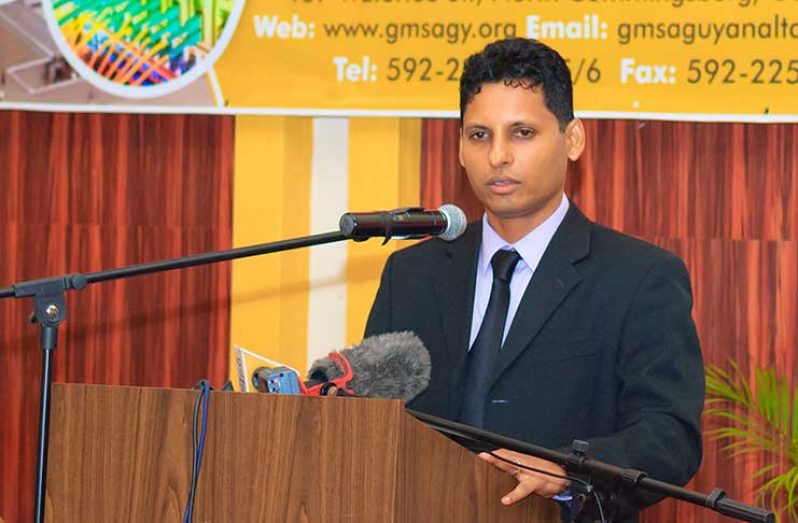– Manufacturing sector curtailed by several challenges
AN inter-ministerial technical team is being formed to oversee the finalisation of the draft Sovereign Wealth Fund (SWF) Bill, Finance Minister Winston Jordan said Thursday evening

during the Guyana Manufacturing and Services Association Limited’s (GMSA) business dinner held at the Pegasus Hotel.
The draft legislation forms part of a menu of measures being initiated by Government ahead of oil production in 2020.
The draft Sovereign Wealth Fund Bill was prepared by the Commonwealth Secretariat, and has benefitted from extensive consultations from a number of Guyana’s multilateral and bilateral partners.
“After that process is completed it will be made available to the public for wide consultations, before being introduced into Parliament,” he posited. Additionally, a Green Paper on the Sovereign Wealth Fund is also being developed.
“What is exciting for our country is, that as we work together on achieving a green growth pathway, the development of our offshore oil and gas natural resources has begun to feature in our medium term fiscal path, with first oil expected mid-2020. This certainly is a turning point in our economic history in the development of the country – one that has not been witnessed since King Sugar was introduced in the 16th Century,” said Jordan.
Already, private sector engagements with ExxonMobil have yielded business opportunities, and though this is a step in the right direction, Minister Jordan said the diversification of the country’s economy is of paramount importance.
“Let me categorically state that the diversification of our economy, with or without oil and gas, is our number one priority,” the Finance Minister asserted while adding, “we are passionate about this, having witnessed what has happened to many countries with large natural resources wealth, which squandered the opportunity to use those resources for economic diversification.”

He noted that the painful consequences of crises and adjustment cycles have been observed, whenever oil prices drop sharply or persistently, or when the resources are exhausted, as they do ultimately.
“We have an opportunity to make Guyana a model country in terms of our responsible use of the oil and gas resources,” the Minister said as he emphasised that discussions on the importance of striking a balance between the amount to be saved for inter-generational security and stabilisation, and investing in the expansion of the economy will continue to remain on the front burner.
Turning his attention to the Manufacturing Industry, the Finance Minister said that in addition to the wide-ranging concessions granted by the previous administrations, the A Partnership for National Unity + Alliance for Change (APNU+AFC) Administration has put several legislative and operational systems in place to further support the industry.
He pointed to the exemption of duty on the import of machinery for use in the manufacturing process and raw materials were maintained. Additionally, the importation of raw materials has been done free of Excise Tax since 2016.
Manufacturers are also granted waivers on duty and taxes for items that are not listed on the approved list of raw materials, providing that applications are made to the Council for Trade and Economic Development (COTED). In this regard, the Ministry of Foreign Affairs has facilitated several private sector companies, over the past six months, in their approach to COTED.
“In response to the numerous complaints of extended processing time to clear imports, several initiatives were implemented by the GRA (Guyana Revenue Authority) that resulted in significant reduction in processing time.
“We have seen the introduction of the ‘Trusted Trader Status’ to compliant importers, including manufacturers. This status entails less frequent checks, and less documents and physical examinations that are subject to internal controls. Manufacturers no longer have to over-stock to reduce the lengthy processing time to clear items, thereby facilitating better inventory and cash management,” Minister Jordan added.
The manufacturing sector, he boasted, has benefitted from a reduced corporate tax rate, declining from 30 percent to 27.5 percent, and for those who generate sales of under $15 million, have been exempted from registering for Valued Added Tax (VAT). VAT rate was also reduced from 16per cent to 14 percent.
Growth in the manufacturing and services sector averaged 2.8 percent and 5.1 percent, respectively over the past decade; the share of manufacturing averaged 7 percent, between 2012-16, increasing incrementally between 2012 and 2015, before falling to 6.5 percent in 2016.
Meanwhile, GMSA President, Shyam Nokta, said while the Manufacturing Industry has been consistent in its performance, much more can be achieved but noted that progress is constrained by a number of challenges, many of which are not new. These issues, he pointed out, range from access to finance at reasonable rates to the unreliable supply of electricity and high freight cost and market access.
Understanding the importance of finding solutions to these challenges, Nokta said last year GMSA submitted a paper called “Boosting and Sustaining the Manufacturing Sector,” which proposed a number of approaches.
He said too, that said while the government has announced its intention to move Guyana from being a primary producer to one where valued is added to the productive sector, recent measures have taken a toll on the industry.
“Tax measures introduced in budget 2017 such as the re-categorising of zero and standard- rated items to exempt, VAT on electricity and forest products among other measures have impacted negatively on the Manufacturing Sector,” Nokta told those present.
According to him, cash flow was reduced in some instances. “These measures have worked against the competitiveness of local manufacturers in both the domestic and overseas markets.”
GMSA, he said, has received reports of local manufactured products being replaced by imported products.
Nokta said too that earlier in the year, the association had cause to express concern over the “rate of deterioration” of the Guyana dollar. While it has been stabilised, the GMSA is concerned whether there will be a reoccurrence considering the downturn of performance of key foreign exchange earners such as bauxite and sugar.
Nevertheless, he said, GMSA remains committed to working with the Government to address the challenges facing the industry.
The GMSA Dinner was also attended by Minister of Business, Dominic Gaskin; Minister of Public Security, Khemraj Ramjattan; Members of the Diplomatic Community and some of the country’s Private Sector officials.



.jpg)









